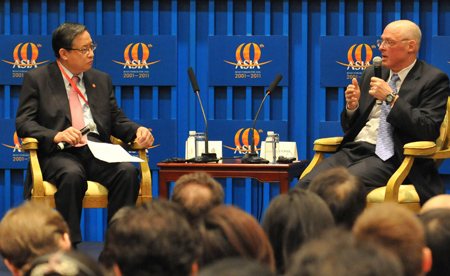Economy
Paulson 'optimistic about economy'
By Li Xing (China Daily)
Updated: 2011-04-16 10:16
 |
Large Medium Small |
|
 |
|
Zhou Wenzhong, secretary-general of the Boao Forum for Asia, talks with Henry Paulson, former United States treasury secretary, about financial supervision, Sino-US cooperation on environmental protection and the Chinese financial markets, in Boao, Hainan province, on Friday.?[Photo / Xinhua] |
Ex-US treasury boss backs broad outline of reform
BOAO, Hainan - Henry Paulson, former United States treasury secretary, sees an increasingly flexible renminbi as more than a tool to combat inflation in the country.
"I look at it as a proxy for reform," he said during a meeting with news media at the Boao Forum for Asia.
"I think when the currency sends a market price signal, it is going to be much easier to transform your economy toward a different growth model, to allocate capital more efficiently," he said.
As the second-largest economy in the world, China has integrated itself more and more into the global economy in trade and services. "I have always believed that it is in China's best interest to move as quickly as possible to a currency that is market determined."
He said there is broad consensus on the need - and "China is on the path" - to reform the formation mechanism of the renminbi's exchange rate in China. The differences lie in the pace and timing.
"What they want is stability and growth, which is the same thing that I want and, I think, the whole world wants," he added.
But the question is what is the best way to achieve it, he said.
Paulson is "optimistic about the outlook of the Chinese economy", but he said China still has to put into effect the great economic transformation it has spelled out in its 12th Five-Year Plan (2011-2015).
"It is difficult to make a comprehensive plan. It is even more difficult to implement the plan," he said.
"I believe that the challenge before China is one of evolution, evolving to an economy where there is more innovation, higher value-added products, less reliance on exports, more on domestic consumption," he said.
| ||||
As to problems in the Chinese economy, he said, every major economy has problems.
"One of the challenges is the fact China is a hybrid economy. It is evolving every day toward reliance on more and more market mechanisms; it also relies on administrative measures," he said. "This model has served very well. But it is increasingly difficult to manage an economy unless the pace of reform in opening-up actually accelerates.
"I know China is very committed to reform and opening-up," he said.
| 分享按鈕 |



